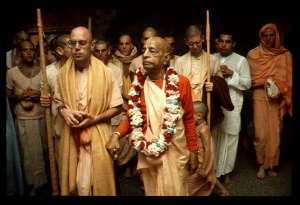CC Antya 5.143: Difference between revisions
m (1 revision(s)) |
No edit summary |
||
| Line 1: | Line 1: | ||
{{ | [[Category:Sri Caitanya-caritamrta - Antya-lila Chapter 05|CC143]] | ||
<div style="float:left">'''[[Sri Caitanya-caritamrta|Śrī Caitanya-caritāmṛta]] - [[CC Antya|Antya-līlā]] - [[CC Antya 5|Chapter 5: How Pradyumna Miśra Received Instructions from Rāmānanda Rāya]]'''</div> | |||
<div style="float:right">[[File:Go-previous.png|link=CC Antya 5.142|Antya-līlā 5.142]] '''[[CC Antya 5.142|Antya-līlā 5.142]] - [[CC Antya 5.144|Antya-līlā 5.144]]''' [[File:Go-next.png|link=CC Antya 5.144|Antya-līlā 5.144]]</div> | |||
{{CompareVersions|CC|Antya 5.143|CC 1975|CC 1996}} | |||
{{RandomImage}} | |||
==== TEXT 143 ==== | ==== TEXT 143 ==== | ||
<div | <div class="verse"> | ||
jarāsandha kahe, | :jarāsandha kahe,—"kṛṣṇa—puruṣa-adhama | ||
tora saṅge nā yujhimu, | :tora saṅge nā yujhimu, "yāhi bandhu-han" | ||
</div> | </div> | ||
| Line 12: | Line 16: | ||
==== SYNONYMS ==== | ==== SYNONYMS ==== | ||
<div | <div class="synonyms"> | ||
jarāsandha | ''jarāsandha kahe''—Jarāsandha says; ''kṛṣṇa''—Kṛṣṇa; ''puruṣa-adhama''—the lowest of human beings; ''tora saṅge''—with You; ''nā yujhimu''—I shall not fight; ''yāhi''—because; ''bandhu-han''—killer of Your own relatives. | ||
</div> | </div> | ||
| Line 19: | Line 23: | ||
==== TRANSLATION ==== | ==== TRANSLATION ==== | ||
<div | <div class="translation"> | ||
"The demon Jarāsandha chastised Kṛṣṇa, saying, 'You are the lowest of human beings. I shall not fight with You, for You killed Your own relatives.' | |||
</div> | </div> | ||
| Line 26: | Line 30: | ||
==== PURPORT ==== | ==== PURPORT ==== | ||
<div | <div class="purport"> | ||
In this verse also, mother Sarasvatī offers prayers to Kṛṣṇa. The word puruṣa-adhama refers to the Personality of Godhead, under whom all other persons remain, or, in other words, puruṣa-uttama, the best of all living beings. Similarly, the word bandhu-han means | In this verse also, mother Sarasvatī offers prayers to Kṛṣṇa. The word ''puruṣa-adhama'' refers to the Personality of Godhead, under whom all other persons remain, or, in other words, ''puruṣa-uttama'', the best of all living beings. Similarly, the word bandhu-han means "the killer of ''māyā''." In the conditioned state of life, one is closely related with ''māyā'' as a friend, but when one comes in contact with Kṛṣṇa one is freed from that relationship. | ||
</div> | </div> | ||
__NOTOC__ | |||
<div style="float:right; clear:both;">[[File:Go-previous.png|link=CC Antya 5.142|Antya-līlā 5.142]] '''[[CC Antya 5.142|Antya-līlā 5.142]] - [[CC Antya 5.144|Antya-līlā 5.144]]''' [[File:Go-next.png|link=CC Antya 5.144|Antya-līlā 5.144]]</div> | |||
__NOTOC__ | |||
__NOEDITSECTION__ | |||
Revision as of 12:02, 3 October 2021

A.C. Bhaktivedanta Swami Prabhupada
TEXT 143
- jarāsandha kahe,—"kṛṣṇa—puruṣa-adhama
- tora saṅge nā yujhimu, "yāhi bandhu-han"
SYNONYMS
jarāsandha kahe—Jarāsandha says; kṛṣṇa—Kṛṣṇa; puruṣa-adhama—the lowest of human beings; tora saṅge—with You; nā yujhimu—I shall not fight; yāhi—because; bandhu-han—killer of Your own relatives.
TRANSLATION
"The demon Jarāsandha chastised Kṛṣṇa, saying, 'You are the lowest of human beings. I shall not fight with You, for You killed Your own relatives.'
PURPORT
In this verse also, mother Sarasvatī offers prayers to Kṛṣṇa. The word puruṣa-adhama refers to the Personality of Godhead, under whom all other persons remain, or, in other words, puruṣa-uttama, the best of all living beings. Similarly, the word bandhu-han means "the killer of māyā." In the conditioned state of life, one is closely related with māyā as a friend, but when one comes in contact with Kṛṣṇa one is freed from that relationship.